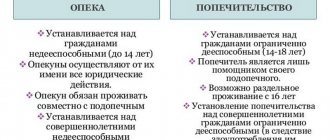Home / Guardianship / Guardianship of a disabled child
Raising a disabled child is responsible and hard work, which requires a lot of strength, patience, mental resources, and money. And although the legislation provides for free medical care, medicines, payments and benefits for seriously ill children and adults, nevertheless, expenses significantly exceed income.
Expert opinion
Semyon Frolov
Lawyer. 7 years of experience. Specialization: family, inheritance, housing law.
It happens that disabled children are left completely without care. For example…
- parents fail to cope with the responsibilities of caring for, treating, and financially supporting their sick son or daughter;
- parents abandoned their sick child in the maternity hospital;
- parents grossly neglect parental responsibilities, abuse alcohol or drugs, use violence, leave the child without care;
- a disabled child is removed from the family (according to Article 77 of the RF IC).
In such cases, the child may be placed under guardianship or guardianship.
But even if the parents did not stop caring for the disabled child, the issue of guardianship or trusteeship will still have to be resolved: if, after reaching 18 years of age, the son or daughter still needs care, help and representation.
In this article we will look at the rules and procedure for obtaining guardianship of a disabled child.
Legislation
According to Article 1 of the Federal Law “On Social Protection of Disabled Persons in the Russian Federation” No. 181 dated November 24, 1995, a disabled person is a person who, due to illness, injury or congenital defect, suffers from persistent disorders of the body, and cannot independently care for himself, understand the meaning of what is happening, control yourself, communicate with others, work. Depending on the severity of the disorder, the sick person is assigned a disability group: first, second, third. A sick minor child (regardless of the nature of the disease) is assigned the status of “disabled child”.
The legislation of the Russian Federation contains provisions intended for comprehensive support of families of disabled people, first of all, the appointment of guardians and trustees for disabled children and disabled adults who need constant outside care, then assistance in recovery, development, education, employment:
- Family Code of the Russian Federation (Chapter 18, Chapter 20);
- Civil Code of the Russian Federation (Article 31—);
- Federal Law No. 48 “On guardianship and trusteeship” dated April 24, 2008;
- Rules for the selection and training of guardians and trustees, approved by Government Decree No. 423 as amended. From 12/21/18;
- The procedure for registering children left without parental care, approved by Order of the Ministry of Education and Science of the Russian Federation No. 101 of March 17, 2016,
- Rules for checking the living conditions of the guardian/trustee, and other features of the procedure for appointing guardianship, approved by Order of the Ministry of Education No. 4 of January 10, 2019;
- The list of diseases for which a person cannot be appointed as a guardian or trustee, approved by Decree of the Government of the Russian Federation No. 117, as amended. dated June 20, 2018;
- The amount and procedure for assigning payments to guardians and trustees of disabled children, established by Decree of the President of the Russian Federation No. 175 “On monthly payments...” as amended. from 03/07/2019.
○ Types of guardianship.
Guardianship for disabled people can be classified according to the following criteria.
- Age. There are guardianships over minors and adult wards.
- Presence of mental disorder. According to this criterion, full guardianship or patronage is assigned.
- Pay for a guardian. Care for a disabled person can be provided free of charge or for a fee.
- The health status of the sick citizen. Classification is carried out by disability group.
Peculiarities of guardianship over a disabled child
Let's consider what are the features and rules for assigning guardianship or trusteeship to disabled people of different ages.
Guardianship
According to Art. 32 of the Civil Code of the Russian Federation, guardianship is appointed over...
- minor children and disabled children under 14 years of age who are left without parental care;
- disabled adults over 18 years of age who, due to illness, injury, or mental disorder, are unable to understand the meaning and consequences of their own actions, manage themselves, or make legally significant decisions if they are declared incompetent by a court decision.
Minor children and adults who have lost the ability to act meaningfully and self-care, and have been declared incompetent, need the care of a guardian.
The guardian not only takes care of the physical needs of a child or a helpless adult (prepares food, purchases clothes and shoes, provides treatment), but also represents the interests of the ward before the state and other persons, makes legally important decisions, and manages the income of the ward.
Care
According to Art. 33 of the Civil Code of the Russian Federation, guardianship is appointed over
- minor children and disabled children from 14 to 18 years old who were left without parental care;
- disabled adults over 18 years of age who, due to illness, injury, or mental disorder, are not fully capable of understanding the meaning and consequences of their own actions, and need support, control and guidance if they are recognized by a court decision as having limited legal capacity.
Guardianship of a disabled child with living parents
Raising, caring for, and maintaining a disabled child is a heavy burden for a mother and father. Some parents are not ready for this; they abandon their newborn child immediately, or later realize that they cannot cope with parental responsibilities and look for ways to take care of the child with outside help. Some parents simply stop caring for the child, as a result of which his life, health, and development are at risk.
The responsibilities of the Guardianship and Trusteeship Authority (CCA) include identifying children left without parental care, including disabled children, selecting guardians and trustees, and transferring children for upbringing, guardianship or care (according to Article 8 of the Federal Law “On Guardianship”) ..."). If the PCO determines that the mother and father are not fulfilling parental responsibilities, he is authorized...
- Conduct a check at the family’s place of residence;
- Remove a child from the family if there is an obvious threat to his life, health, or development;
- Initiate the procedure for depriving the mother and father of parental rights;
- No later than 1 month after the child receives the status of “left without parental care,” find a guardian or trustee and place the child in foster care.
First of all, representatives of the PLO interview close relatives of a disabled child: grandparents, older brothers and sisters - perhaps one of them will express their readiness to become a guardian or trustee. If no one among the relatives wants to take care of a disabled child, a guardian or trustee will be selected from among strangers, or the child will be transferred under the supervision of a specialized institution.
Placing a child under guardianship or guardianship is not always associated with parental irresponsibility or malicious failure by the mother and father to fulfill parental responsibilities. Sometimes, due to work or illness, parents are simply unable to pay attention to their sick child and take care of him.
In this case, it is permissible to transfer the child under temporary guardianship or guardianship (Article 13 of the Federal Law “On Guardianship...”). The temporary guardian or trustee of a disabled child will be a person chosen by the parents themselves; as a rule, this will be a close relative: grandmother, grandfather, aunt, uncle, older brother or sister.
However, the identity of a guardian or trustee, even a temporary one, is strictly verified by representatives of the PLO. For example, if a grandmother works at night or is seriously ill, as a result of which she cannot take care of a sick child, she will be denied guardianship or care.
Guardianship or guardianship after 18 years of age
Once a disabled child reaches adulthood, guardianship and trusteeship over him ceases. The law does not provide for the extension of guardianship or trusteeship over a sick person, regardless of the severity of the disease, disorder, or injury.
But if a disabled adult still needs guardianship or care, you must first go to court with a claim for deprivation or limitation of legal capacity. Only after the court makes a positive decision, depriving or limiting the legal capacity of a disabled person, will the PLO appoint a guardian or trustee for him within 1 month The priority right to become a guardian or trustee for a sick person is given to his close relatives and people who previously lived with him and took care of him.
Read more “How to obtain guardianship over a disabled person of groups 1, 2, 3.”
Patronage
If a disabled child reaches adulthood, guardianship and trusteeship over him is terminated, and if there are no grounds to deprive or limit the disabled person’s legal capacity, patronage may be assigned to him.
According to Art. 41 of the Civil Code of the Russian Federation, patronage is assigned to fully capable adult disabled people who are fully aware of the meaning of their own actions, can make decisions and guide themselves, but due to illness, injury, or congenital defect, cannot independently care for themselves. Patronage involves assistance in everyday life, accompaniment to a clinic or government service, paying bills, buying groceries or medicines. The patronage assistant does not make legally important decisions, does not manage income and property, and does not represent the interests of the disabled person.
Patronage is not assigned to disabled children.
Who can become a guardian?
The law places high demands on those who express a desire to become a guardian or trustee. Especially if the child in his care is disabled, since caring, raising and maintaining a sick child requires a lot of effort and material resources from the adult caring for him.
When selecting a guardian or trustee for a sick child, the educational institution is guided by the provisions of: Art. 35 Civil Code of the Russian Federation, Art. 146 RF IC, Art. 10 of the Federal Law “On Guardianship...”, as well as in the Rules for the selection and training of guardians and trustees, established by Decree of the Government of the Russian Federation No. 423 of May 18, 2009.
Basic requirements for a guardian and trustee of a disabled child:
- Voluntary consent. The appointment of guardianship or trusteeship contrary to consent is unacceptable (Clause 2 of Article 11 of the Federal Law “On Guardianship...”).
- Age of majority. The lower age limit is 18 years, the upper one is 60 years, however, if the ward child is a relative (grandchild, nephew or niece), the guardian or trustee may be over 60 years old.
- Full legal capacity.
- Constant source of income. The law does not stipulate the lower and upper limits of income, but its source must be constant: pension, wages, social benefits, remuneration, since funds are constantly needed to support a child.
- Permanent place of residence . Having your own living space is not necessary; living in rented or municipal housing is acceptable.
- Completing special preparatory courses and obtaining a certificate. Close relatives of a disabled child, as well as people who already care for him, are exempt from the mandatory course.
Restrictions for guardian and trustee:
- Deprivation of parental rights. A person who has previously been deprived or limited in parental rights in relation to his own child cannot be a guardian or trustee.
- A conviction for committing a serious criminal offense against life or health is an unambiguous basis for refusal to assign guardianship.
- Same-sex marriage. According to the legislation of the Russian Federation, marriage between two men or two women is impossible, but some same-sex couples enter into such marriages in other states. Such people cannot be guardians and trustees of children in the Russian Federation.
- Disease that interferes with the performance of guardianship duties: tuberculosis; oncological diseases; alcohol or drug addiction; infectious diseases until complete recovery; mental illness until stable remission; other. The full list of diseases is listed by Government Decree No. 117 dated February 14, 2015.
Can a disabled person be a guardian or trustee of a disabled child?
The restriction on the performance of guardianship duties applies only to disabled people of group 1. But, in addition to this, a number of diseases listed above are an obstacle, even if they did not become the basis for disability.
However, if the PLO refused to assign guardianship/trusteeship due to illness, such refusal can be challenged in court.
Example Citizen Fomina filed a lawsuit to challenge the conclusion of the Guardianship and Trusteeship Authority that she was unable to serve as a guardian for her 12-year-old niece. The reason for Fomina’s refusal was a recently discovered cancer. However, the disabled child had been living with his aunt’s family for several years. The girl’s previous guardian was Fomina’s husband, who died a month ago, after which guardianship was terminated.
In the statement of claim, Fomina indicated that a sudden change of place of residence and the loss of a close and caring relative would be traumatic for the child. Having studied the circumstances, the court granted the claim and ordered the PLO to appoint Fomina as her niece’s guardian despite her illness.
Algorithm of actions
What actions need to be taken after all the papers have been collected? We will try to present the entire algorithm in the form of condensed instructions. Naturally, remember that bureaucratic processes can last quite a long time and take a lot of time. How to obtain guardianship of a child? What specific actions characterize such a procedure? Registration of guardianship includes the following stages:
- inspection of applicants’ real estate and drawing up a report on housing conditions;
- transfer of a package of documents (the list is indicated above) to the necessary government authority;
- obtaining a conclusion from the guardianship authorities (valid for two years);
- contacting the appropriate organization to obtain data about children who need guardianship (local or federal data bank);
- receiving a referral to meet a child;
- determining the opinion of the future ward;
- drawing up a deed and a guardianship agreement.
Rights and obligations
The list of rights and responsibilities vested in a guardian and trustee in relation to a child under his or her care, including a child with a disability, is contained in Art. 36 Civil Code of the Russian Federation, art. 146 and art. 148.1 RF IC, Article 15 Federal Law “On guardianship...”
Responsibilities:
- Protect the rights of the ward;
- Represent the interests of the child in all state, municipal, and private organizations;
- Live with a disabled child under your care
- Promote recovery or maintain health (follow medical orders for treatment, exercise, medication);
- Support the child, create conditions for him in which his basic needs will be satisfied;
- Monitor the safety of property belonging to the ward, use his funds exclusively in his interests: for his maintenance, treatment, development, education.
Rights:
- Be the legal representative of the ward;
- Request for the assignment of benefits, benefits, payments, material assistance (vouchers, gifts, medicines) to the ward;
- Demand compensation or compensation for damage caused to the health or property of the ward;
- Receive assistance in fulfilling guardianship duties: legal, social, medical, psychological and pedagogical support;
- Receive remuneration for performing guardianship duties.
Not everyone knows that the law allows you to relieve yourself of guardianship responsibilities if caring for a disabled child under your care has become a burden (Clause 3, Article 29 of the Federal Law “On Guardianship...”).
How to obtain guardianship of a disabled child:
Let's consider the order in which guardianship and trusteeship are assigned - from the moment when a disabled child is left without parental care, and until the moment when the guardian or trustee accepts the ward into the family and begins to fulfill the duties assigned to him.
Where to contact?
According to Art. 35 of the Civil Code of the Russian Federation, guardianship or trusteeship of a disabled child is assigned by the public educational institution at the place of residence of the ward - within 1 month after the need for a guardian or trustee is established. But a person who intends to become a guardian or trustee for a disabled child can apply to the Guardianship and Trusteeship at his or her place of residence . This is provided for in clause 4 of the Rules for the selection of guardians and trustees for children, established by Decree of the Government of the Russian Federation No. 423, as amended. dated 12/21/2018.
Procedure
Step by step procedure:
- Consultation in the PLO;
- Preparation of a package of documents;
- Completing a training course for guardians/trustees and obtaining a certificate;
- Submitting a statement of intent to take custody or guardianship of a disabled child to the Public Education Office;
- Inspection and inspection of the residential premises where the guardian/trustee will live with the ward;
- Conclusion on the possibility of being a guardian or trustee, issued by the POO based on the results of review of documents and inspection of housing (within 10 days);
- Familiarization with the conclusion (no later than 3 days);
- Making a decision on the appointment of guardianship/trusteeship;
- Conclusion of an agreement between the PLO and the guardian/trustee;
- Transferring a disabled child into guardianship or trusteeship.
Features of the procedure
The first step to take is to contact your local PSO for advice. Since the final result of the procedure - appointment or refusal - depends on the OOP, it is advisable to establish effective joint work as early as possible. A representative of the PLO will find out all the essential circumstances, provide a list of documents and directions to preparatory courses, and give useful advice.
According to Article 35 of the Civil Code of the Russian Federation, guardianship or trusteeship must be appointed no later than 1 month after a disabled child has lost parental care and begins to need outside help. But since the procedure for appointing guardianship sometimes lasts much longer, in addition, guardians and trustees undergo strict selection and mandatory training, two temporary solutions are possible :
- Transferring the child under the supervision of a specialized institution (social, medical, educational);
- Transfer of a child to the preliminary guardianship/guardianship of a person who is still undergoing the registration procedure: submission of documents, inspections (Article 12 of the Federal Law “On Guardianship...” - on the basis of an identity document and inspection of the residential premises).
The basis for starting the guardianship procedure is an application submitted by the future guardian/trustee, as well as documents (clauses 4-5 of the Rules for the selection of guardians and trustees, approved by Decree of the Government of the Russian Federation No. 423, as amended on December 21, 2018).
3 working days to visit the place of residence of the future guardian or trustee and conduct an inspection (clause 8 of the Rules for the selection of guardians and trustees). During the inspection, the following is taken into account:
- area and number of residents,
- the presence of a separate room or part of the room for sleep and leisure of the ward,
- purity,
- warm,
- lighting,
- water and sewerage,
- availability of food.
In addition, the representative of the PLO evaluates the personal qualities of the guardian or trustee, the relationship between members of his family, material and moral resources, motives and intentions.
A report is drawn up on the results of the inspection. After reviewing the application, documents, and conducting a housing inspection, the PLO issues an opinion on the possibility (or refusal) to be a guardian or trustee . The document is drawn up in accordance with Appendix 13, approved by Order of the Ministry of Education and Science of the Russian Federation No. 101 dated March 17, 2016.
The conclusion is valid for 2 years - it serves as the basis for making a final decision (order or resolution) on the appointment of guardianship or trusteeship .
Application (sample)
An application is not only a formal document that serves as the basis for the appointment of guardianship or trusteeship, but also an important source of information about the future guardian or trustee.
Order No. 4 of the Ministry of Education of the Russian Federation dated January 10, 2019 approved a special application form (Appendix 4).
The application must contain the following information:
- Name and address of the POO;
- Information about the applicant: Full name, date of birth, place of residence;
- Criminal record information;
- Information about receiving a pension (if the applicant is a pensioner and pension payments are his only or main source of income);
- Information about family members and relatives living together (full name, date of birth, degree of relationship), consent for a disabled child under his care to live together with them;
- Information about financial situation, household amenities, health status, field of activity (confirming the ability to perform guardianship duties);
- Information about completing preparatory courses and obtaining a certificate;
- Please issue a conclusion on the possibility of being a guardian/trustee and transferring a disabled child (indicating full name, date of birth) to the family;
- List of applications;
- Date of;
- Signature.
How to get benefits for orphans: federal and regional
The state helps foster parents, guardians and trustees. But many do not know what payments they are entitled to. The money can be spent on food, payment for personal hygiene products, furniture, clothing, etc. The E&P body has the right to conclude an agreement with a citizen performing the role of a guardian on the performance of functions on a reimbursable basis.
Please note: when choosing a guardian, the guardianship authorities take into account the opinion of the teenager himself, and therefore the guardian must also please him.
Guardianship of a minor is terminated without a special decision when the minor ward reaches eighteen years of age, as well as upon his marriage and in other cases of his acquiring full legal capacity before reaching adulthood (clause 2 of Article 21 and Article 27).
When a ward, an adopted child studying full-time in a general education institution reaches the age of eighteen, payment of funds is made directly to the former ward, an adopted child until he graduates from a general education institution.
The application must be considered no later than 10 days from the date of its receipt with all necessary documents.
The state provides reliable support for orphans until they reach adulthood and receive vocational education. Namely, before orphans are 18 or 23 years old. Also, the child ceases to receive social benefits if the parents have been given the right to raise and provide for the child’s life.
Control over compliance by citizens and officials with the Registration Rules rests with the Federal Migration Service, its territorial bodies and internal affairs bodies.
List of documents
The list of documents that must be attached to the application depends on the age of the disabled person over whom guardianship or trusteeship is being issued: for a disabled minor child - one package of documents, for an adult disabled person deprived or limited in legal capacity - another package of documents.
Documents of a guardian/trustee for a disabled child (according to the Rules for the selection and training of guardians..., approved by Decree of the Government of the Russian Federation No. 423 of May 18, 2009):
- passport;
- autobiography;
- medical report;
- document (certificate, order) at the place of work with information about the position held, income for the last 12 months;
- document (certificate, extract from the house register, rental agreement or certificate of ownership) at the place of residence;
- certificate of completion of the preparatory course;
- written consent of relatives and family members living together.
Documents for a disabled child:
- birth certificate or passport;
- consent to guardianship (if the disabled child is over 10 years old);
- medical report;
- conclusion (certificate) of MSEC;
- individual treatment and rehabilitation program;
- insurance policy;
- documents (agreements, certificates of ownership) for property belonging to the child;
- documents confirming the lack of parental care (refusal or application of parents for temporary guardianship/trusteeship, a court decision on the deprivation of the mother and father of freedom, restriction or deprivation of parental rights, restriction or deprivation of legal capacity, recognition as missing, a decision of the public educational organization on the removal of a disabled child from families (according to Article 77 of the RF IC), a resolution of the Public Prosecutor’s Office on granting a disabled child the status of “left without parental care.”
Documents of a guardian/trustee of a disabled person who has reached the age of majority (in accordance with the Rules for the selection and training of guardians..., established by Decree of the Government of the Russian Federation No. 927 as amended on December 21, 2018):
- passport;
- autobiography;
- marriage certificate (if the guardian/trustee is married);
- a document confirming the relationship with the disabled person under his care;
- document (certificate) at the place of work with information about the position, income for the last 12 months;
- pensioner's ID;
- medical report;
- written consent of all relatives of family members, including children over 10 years old (if the disabled ward will live with them);
- certificate of completion of the preparatory course.
Important! If the guardian or trustee is a close relative of a disabled adult (mother or father, grandmother or grandfather, brother or sister) or a person who has taken care of him in the last 10 years, the list of documents can be significantly reduced. See “How to obtain guardianship over a disabled person of groups 1, 2, 3”
Documents for an adult disabled person deprived or limited in legal capacity:
- passport;
- medical report
- MSEC certificate;
- insurance policy;
- individual treatment and rehabilitation program;
- documents on ownership of property owned by a disabled person.
In addition, the OOP requests documents and verifies the following information:
- criminal record certificate;
- certificate of the amount of pension, benefits, payments and benefits;
- a certificate of family composition at the place of residence or an extract from the house register.
○ Methods for registering guardianship.
To begin caring for a sick person, you need to follow the procedure for registering guardianship.
✔ In what authorities is guardianship formalized?
Full guardianship is granted through the court. To do this, the future guardian, relative of the disabled person, medical institution or guardianship authority applies there with an application. The court orders a medical examination for a sick person, on the basis of which a conclusion is made on the need to establish guardianship for the disabled person. The future guardian submits documents to the guardianship authorities indicating that he will be able to care for a sick person. Next, a hearing is held to appoint a guardian for the incapacitated person. He is elected by the court in agreement with the authorities.
If a disabled person does not have mental disabilities, going to court is not required. An application is submitted to the guardianship authorities to appoint an assistant to a citizen requiring outside care. Within a month, the chosen guardian is approved by a decision of the authority.
✔ What documents need to be provided?
Documents from the guardian:
- Passport.
- Autobiography.
- Characteristics from the place of employment.
- Extract from home ownership.
- A medical certificate indicating the absence of health problems.
- An act of inspection of living conditions and the consent of the guardian’s family members to accept a disabled person into the family.
- Certificate of good conduct.
- Certificate of income.
From the mentee:
- Passport.
- ITU conclusion on assignment of disability group.
- A court decision declaring a person incompetent.
- Extract from the property.
- Data from the Pension Fund on the amount of pension.
- Data on property owned by a disabled person (for example, Extract from the Unified State Register of Real Estate).
Payments
It is difficult to suspect a guardian or trustee of a sick child or disabled adult of self-interest, considering how much they pay for such hard work. As a rule, such responsibilities are assumed by unselfish close relatives.
However, a guardian or trustee can count on some government payments and benefits:
- one-time benefit when registering guardianship /custody of a minor child . Read more in our article “How much do they pay and what payments are there for guardians of minor children”;
- monthly remuneration if paid guardianship or trusteeship (over a disabled adult or child) has been issued.
To assign remuneration, the guardian or trustee must sign an agreement with the POO, which will contain the procedure for payment and the amount of remuneration for the performance of guardianship duties (in accordance with Article 16 of the Federal Law “On Guardianship...” and the Rules for concluding an agreement on paid guardianship..., approved by Decree of the Government of the Russian Federation No. 927 as amended on December 21, 2018);
- local payments , additional payments and benefits for a minor child (assigned by local authorities and self-government and paid from the local budget, so the amount and rules for receiving depend on the place of residence);
- monthly payments for a guardian or custodian minor child amount of 10,000 rubles (according to Decree of the President of the Russian Federation No. 175 On monthly payments... as amended on 03/07/2019) .
- monthly payment in the amount of 1200 rubles for a guardian, trustee, patronage assistant who takes care of an adult disabled person and has no other sources of income (according to the Decree of the Government of the Russian Federation On monthly compensation payments for non-working able-bodied citizens... No. 343, as amended on October 30. 2018).
Expert opinion
Dmitry Nosikov
Lawyer. Specialization: family and housing law.
As you can see, the procedure for registering guardianship or trusteeship over a sick disabled child is practically no different from the registration procedure if the child is healthy, and after the disabled child reaches 18 years of age, a repeat procedure for registering guardianship or trusteeship is needed - only after deprivation or limitation of legal capacity disabled person
Do you have any questions? Do you need individual legal advice?
Our lawyer is ready to advise you free of charge on issues of guardianship of a disabled child or a disabled person of groups 1, 2, 3 over 18 years old?
Regarding the preparation of documents and registration procedures? Payments or allowances? Leave any question in the 24/7 legal support chat or call the hotline. Attention!
- Due to frequent changes in legislation, information sometimes becomes outdated faster than we can update it on the website.
- All cases are very individual and depend on many factors. Basic information does not guarantee a solution to your specific problems.
That's why FREE expert consultants work for you around the clock!
- via the form (below), or via online chat
- Call the hotline:
- Moscow and the Region
- St. Petersburg and region
- FREE for a lawyer!
By submitting data you agree to the Consent to PD Processing, PD Processing Policy and User Agreement.
Anonymously
Information about you will not be disclosed
Fast
Fill out the form and a lawyer will contact you within 5 minutes
Tell your friends
Rate ( 1 ratings, average: 5.00 out of 5)
Author of the article
Irina Garmash
Family law consultant.
Author's rating
Articles written
612
Monthly fees for guardianship
Issues of types of benefits and payments due to guardians are regulated. They are recorded in Federal Law No. 81 dated May 19, 1995, as well as in Order of the Ministry of Health and Social Development of the Russian Federation No. 1012n dated December 23, 2009. The amount of benefits for guardians in 2020 is established by the relevant resolutions of the Government of the Russian Federation.
Attention! Federal legislation leaves it to the regions to establish the amount of social benefits for guardians of minors. It only establishes general principles for payments to guardians:
It only establishes general principles for payments to guardians:
- for non-workers - 2,908.62 rubles. on the 1st, and 5,817.24 rubles. for the 2nd and subsequent children;
- for workers - 40% of the average wage, but not more than 23,120.66 rubles.
Payment terms
Benefit payment periods:
- One-time payments are issued if they are applied for no later than 6 months after the decision to establish guardianship is made. Assigned and paid within 10 days from the date of receipt of the application with the necessary package of documentation.
- Monthly payments are assigned if they are applied for no later than 6 months after the conclusion of an agreement to transfer the baby to a foster family. Paid for the entire period during which the guardian had rights to payment of benefits.
Download for viewing and printing:
Regional payments
Regional regulations establish different amounts of benefits for supervised children. Financial allocations depend on the age category of the ward and the number of wards in the family.
For example, in Moscow, if a child has not reached the age of 12, and his parents were deprived of their family rights, he was left without adult support - due to their death or for another reason - the citizen who accepted him into his family is paid 15 thousand monthly. rub. When guarding a child aged 12-18 years, his adoptive parents are paid 20 thousand rubles. every month. If the number of children under care is more than 2, then an additional payment of 3 thousand rubles is made for each of them. Studying at a higher educational institution for a child under guardianship makes it possible to receive funding at the same level until the student turns 23 years old. But in this case, payments are reissued every six months. The presence of physical ailments in the child under care, confirmed by the status of a disabled person, increases the amount of payments to 25 thousand rubles.
Financial assistance provided to guardians/trustees is targeted. This money is not intended to satisfy the personal needs of guardians and does not act as some kind of reward for the social work they do. In fact, all the money is intended to support the children in their care. Satisfying their household, school and other personal needs.









